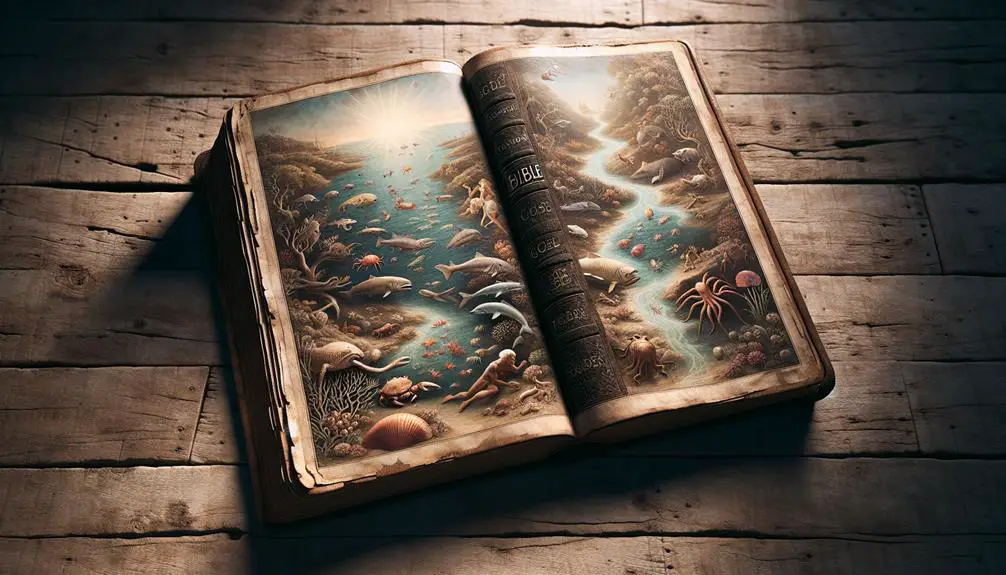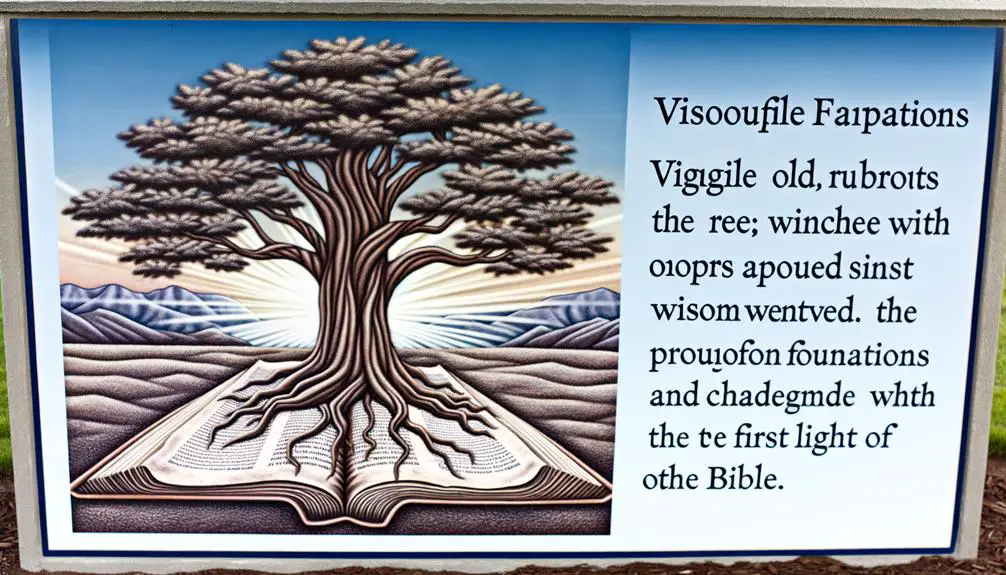Plunge into the biblical depths where creation begins and divine mysteries await, revealing a journey through faith, despair, and unparalleled love.

The Deep in the Bible
Navigating through the Bible, you'll find that 'the deep' isn't just a drop in the ocean; it's a vast expanse that holds mysteries, wisdom, and divine revelations.
From the waters of creation in Genesis to the promise of no more sea in Revelation, you're invited on a journey that explores the multifaceted depths of God's word.
You'll discover the unreachable depths of Job's despair, the abyss that calls out in Psalms, and the profound depths of God's love in Romans.
Each reference offers a unique lens through which to view the complexities of faith, life, and the divine.
So, why stop at the surface when there's so much more beneath?
Key Takeaways
- The deep symbolizes chaos, disorder, and the need for divine intervention and sovereignty in biblical texts.
- Transformation and renewal themes in the deep reflect divine harmony, eradicating chaos for eternal peace.
- Narratives involving the deep, such as Job and Jonah, explore human despair and divine deliverance, emphasizing obedience and redemption.
- The portrayal of the deep serves as a metaphor for profound changes and the depths of God's love and wisdom.
Genesis: Waters of Creation

In the Book of Genesis, the narrative begins with God creating the heavens and the earth, initially depicted as a formless void shrouded in darkness and covered by deep waters. This opening sets a foundational tone for the biblical portrayal of water, particularly the ocean, as laden with symbolism. You're introduced to a concept where water embodies primordial chaos, a notion prevalent in ancient Near Eastern creation myths. This oceanic symbolism in Genesis isn't merely geographical or meteorological; it's deeply theological, reflecting the chaotic state from which order and life emerge.
The depiction of deep waters as a symbol of primordial chaos serves a dual purpose. Firstly, it highlights the omnipotence of God, who imposes order on chaos, separating the waters to create the sky and the earth. This act of separation transforms the chaotic deep into a life-giving source, underlining the theme of divine sovereignty and creative power. Secondly, the imagery of water as both life-giving and chaotic reflects a profound understanding of the natural world's dual nature. You're invited to ponder the paradox of water as essential for life yet capable of representing chaos and destruction.
This complex oceanic symbolism in Genesis lays the groundwork for understanding the deep's role throughout the Bible. It's not just about the physical properties of water or the historical context of these narratives; it's about the theological implications of water as a symbol of both life and chaos. This dual symbolism enriches your appreciation of biblical themes, offering insights into the ancient worldview that saw the divine hand in the natural order and chaos.
Job: Depths Beyond Reach

You'll find that Job's narrative pulls you into an exploration of human suffering and its complexities. This text uncovers layers of divine wisdom, challenging your understanding of justice and morality.
It's an intricate examination of themes that resonate with the depths of human experience, beyond what's easily comprehended.
Job's Suffering Explored
Delving into Job's suffering unveils a narrative rich in themes of endurance and the human condition, challenging readers to explore depths beyond reach. Job's plight embodies patience's virtue, as he navigates through his calamities with a steadfast spirit.
This biblical account doesn't just recount a tale of suffering; it prompts existential questioning, urging you to ponder the nature of suffering, divine justice, and human resilience. Job's unyielding faith amidst his trials demonstrates a profound exploration of belief and doubt, making his story a cornerstone for those wrestling with the complexities of faith in the face of adversity.
This narrative doesn't only engage with the theology of suffering but also delves into the very essence of human perseverance and the quest for understanding amidst inexplicable tribulations.
Divine Wisdom Unveiled
Exploring Job's suffering offers a foundation upon which to uncover the layers of divine wisdom presented through his trials. The narrative delves deep into cosmic order and sacred mysteries, revealing aspects of divine wisdom that are:
- Incomprehensible to the human mind.
- Rooted in the complexities of cosmic order.
- Reflective of the balance between justice and mercy.
- Beyond the grasp of human reasoning, yet accessible through faith.
This exploration underscores the notion that divine wisdom often transcends human understanding, inviting you to trust in a higher plan amidst suffering. It challenges you to consider the vastness of the sacred mysteries and the role of faith in navigating the depths beyond reach, where reason fails and trust begins.
Psalms: The Abyss Calls

In the Psalms, the concept of the abyss serves as a profound metaphor for despair and divine deliverance, reflecting a deep spiritual and emotional resonance within the human experience. This scriptural collection frequently employs oceanic metaphors to articulate the depth of human suffering and the vastness of God's salvation. The imagery of water, often tumultuous and unfathomable, encapsulates the overwhelming nature of adversity that the psalmists face. Yet, these same waters also symbolize the boundless mercy and redemption that God extends to those who call upon Him.
The use of Psalmodic echoes throughout the Psalms reinforces this duality. As the psalmists recount their anguish and plea for deliverance, they often draw on the imagery of being engulfed by waters, sinking into the depths, or being swept away by floods. These descriptions not only convey the intensity of their despair but also the magnitude of God's rescue. The abyss, therefore, becomes more than a mere physical space—it transforms into a spiritual realm where human vulnerability meets divine power.
Analyzing these Psalms, one discerns a pattern where the abyss doesn't solely signify hopelessness. Instead, it beckons a deeper engagement with faith, a call to trust in the midst of turmoil. The oceanic metaphors and Psalmodic echoes serve not just as literary devices, but as theological expressions that navigate the believers' journey from despair to hope, from the depths of the sea to the safety of the shore, guided by the divine hand.
Proverbs: Wisdom's Deep Foundations

In exploring 'Proverbs: Wisdom's Deep Foundations,' you encounter the practical applications of wisdom, highlighting how these teachings aren't just theoretical but are meant for daily living.
The timeless principles within Proverbs provide a framework that transcends generations, offering guidance that remains relevant today.
Through the use of parables, understanding is facilitated, allowing you to grasp complex truths in a more accessible manner.
Wisdom's Practical Applications
Wisdom's practical applications, as illuminated in the book of Proverbs, serve as a foundational guide for living a morally upright and fulfilling life. This text, rich in wisdom literature, offers insights into achieving a balance between intellectual humility and ethical discernment. These two virtues are pivotal in navigating life's complexities.
Proverbs emphasizes:
- Intellectual humility as the recognition of one's limitations and the openness to new learnings.
- Ethical discernment as the ability to distinguish right from wrong in varying contexts.
- The value of hard work and diligence.
- The importance of honest communication.
Understanding and applying these principles fosters a life marked by wisdom and integrity, guiding individuals towards making thoughtful decisions and maintaining meaningful relationships.
Proverbs' Timeless Principles
Delving into the book of Proverbs, you'll uncover timeless principles that serve as the bedrock for cultivating a life of wisdom and moral rectitude.
Principle |
Financial Prudence |
Interpersonal Relationships |
|---|---|---|
Guidance |
Save diligently, spend wisely |
Listen before speaking |
Caution |
Avoid debt traps |
Steer clear of gossip |
Virtue |
Generosity benefits society |
Kindness wins hearts |
Discipline |
Budgeting is essential |
Respect boundaries |
Insight |
Wealth isn't happiness |
Trust builds over time |
These principles emphasize a balanced approach to life, highlighting that financial prudence and healthy interpersonal relationships are intertwined. By applying these insights, you're not just navigating through life more smoothly but are also laying a solid foundation for personal growth and societal harmony.
Understanding Through Parables
Parables, as employed in Proverbs, serve as foundational tools for imparting wisdom, offering you deep insights into life's complexities. These narratives, rich in cultural metaphors, extend beyond their historical context to find resonance in modern interpretations. They're not just ancient texts but are intertwined with contemporary experiences, illuminating paths through moral and existential dilemmas.
To understand their enduring relevance:
- Parables use familiar scenarios, making abstract concepts concrete.
- They bridge cultural gaps, allowing wisdom to transcend time.
- Modern interpretations rejuvenate these stories, showing their adaptability.
- Cultural metaphors serve as keys to unlocking deeper meanings.
Analyzing Proverbs through this lens offers a profound appreciation of its wisdom, highlighting its capacity to guide, challenge, and inspire across generations.
Jonah: Depths of Despair

The story of Jonah encapsulates a profound narrative of despair, illustrating how one's flight from divine command can plunge an individual into the darkest abysses of turmoil and regret. This tale, deeply embedded within maritime history, not only chronicles the physical journey of a man swallowed by a great fish but also navigates the turbulent waters of human disobedience and redemption. Jonah's ordeal under the waves becomes a powerful allegory for the spiritual depths one can reach when trying to evade the divine will.
Analyzing the prophet's legacy, it's clear that Jonah's narrative serves as a pivotal exploration of despair and defiance against God's commands. His initial refusal to prophesy against Nineveh and subsequent punishment by being cast into the sea and swallowed by a great fish symbolize the profound depths of despair to which disobedience can lead. Yet, this story is as much about redemption as it's about despair. Within the belly of the beast, Jonah's prayer and repentance highlight a path out of the depths, suggesting that even in the darkest moments, hope and redemption remain within reach.
Furthermore, Jonah's eventual compliance with God's command and the subsequent salvation of Nineveh underscore a crucial theological point: divine mercy and forgiveness are omnipresent, even in the depths of despair. Thus, the narrative of Jonah transcends its maritime setting, offering timeless lessons on obedience, repentance, and the transformative power of divine mercy. Through Jonah's journey, the Bible articulates a profound understanding of human frailty and the endless depths of God's compassion.
Matthew: Miracles Over the Deep

In Matthew's gospel, miracles performed over the sea not only demonstrate Jesus' mastery over nature but also serve as pivotal moments that deepen our understanding of his divine authority. These episodes, rich in symbol and significance, underscore the themes of storm calming and faith testing, central to Matthew's portrayal of Jesus' ministry.
The narrative of Jesus calming the storm, for instance, isn't merely about a miraculous intervention but also about faith's role in the face of fear and uncertainty. Here, Jesus questions the disciples' fear and lack of faith, challenging them to trust in his power even when confronted with the seemingly uncontrollable forces of nature.
Similarly, when Peter walks on water and begins to sink due to his doubt, the focus is on the necessity of unwavering faith in Jesus' ability to save. This incident further illustrates the theme of faith testing, showing that faith must be maintained even in the most dire of circumstances.
To emphasize the significance of these miracles over the deep, consider the following points:
- Demonstration of Divine Authority: Each miracle reinforces Jesus' dominion over the natural and supernatural realms.
- Faith Testing: The disciples' responses to these miracles serve as tests of their faith and understanding of Jesus' identity.
- Revelation of Jesus' Identity: These acts reveal Jesus as the Messiah, capable of controlling the forces of nature.
- Instructional Moments: Through these events, the disciples, and by extension, the readers, are taught about the nature of faith and the necessity of trust in Jesus.
These miracles, therefore, aren't just acts of power but also profound lessons in faith, authority, and the recognition of Jesus' unique role in salvation history.
Romans: Depths of God's Love

Exploring the depths of God's love, Paul's letter to the Romans offers profound insights into the nature of divine affection and grace. This epistle meticulously unpacks how grace explored becomes the foundation upon which believers stand, revealing the redemption depth that underpins the Christian faith. Paul's discourse transitions from the depths of human sin to the heights of God's grace, illustrating a divine love that's both unfathomable and accessible.
Grace explored in Romans isn't a mere theological concept; it's the operational force of God's love in action. Paul emphasizes that grace is freely given, not earned, showcasing the depth of God's commitment to humanity's redemption. This grace brings about reconciliation, transforming the relationship between Creator and creation. It's in this context that the depth of redemption is most vividly seen. Redemption depth in Romans signifies the extensive lengths to which God is willing to go to restore humans to righteousness.
Paul meticulously argues that the depth of God's love is demonstrated through the sacrifice of Jesus Christ, an act that personifies grace and redemption. This sacrificial love is the cornerstone of faith, illustrating that the depths of God's love aren't passive but actively seeking to redeem and transform. Through Paul's letter, one grasitates towards a deeper understanding of divine love – a love that's both profound in its depth and radical in its grace. The exploration of these themes in Romans challenges believers to reflect on the magnitude of God's affection and the transformative power of His grace in their lives.
Revelation: The Sea No More

Shifting focus to the Book of Revelation, we encounter a striking declaration: 'the sea is no more,' symbolizing the culmination of divine transformation and renewal in the new creation. This imagery isn't merely about the absence of physical seas but serves a deeper, symbolic purpose. Ocean symbolism throughout biblical literature often carries connotations of chaos, danger, and the unknown. Hence, the absence of the sea in the new creation signifies the ultimate eradication of chaos and the establishment of eternal peace and order.
The absence of the sea also has implications for marine life, traditionally teeming within these vast waters. This leads us to ponder the fate of such life in the new creation and the broader symbolism of water in biblical prophecy. To better understand this, consider the following points:
- Ocean symbolism often represents chaos and disorder, suggesting that 'the sea no more' indicates a new order of existence without chaos or fear.
- The mention of no sea implies a transformation of the natural world, aligning with the theme of renewal throughout Revelation.
- This imagery challenges us to reevaluate our understanding of creation and its culmination, emphasizing a move towards spiritual rather than physical restoration.
- The fate of marine life in this context is symbolic, pointing towards a new creation where the limitations and dangers of the current world are transcended.
Analyzing this passage, we see a complex interplay of symbols, drawing our attention to the profound changes in the new creation where the familiar, including the vast oceans, is radically transformed or absent, heralding a realm of divine harmony and eternal peace.
Frequently Asked Questions
How Do Contemporary Theologians Reconcile the Concept of 'The Deep' in the Bible With Modern Scientific Understanding of the Ocean and Space?
You're exploring how theologians today blend ancient texts with our knowledge of oceans and the cosmos. They delve into ocean metaphysics and space theology, seeking harmony between scripture and science.
In What Ways Have Different Cultures and Religions Outside of Christianity Interpreted or Incorporated the Biblical Concept of 'The Deep' Into Their Own Spiritual Texts or Beliefs?
You're exploring how various cultures and religions have woven the concept of 'the deep' into their spiritual narratives, independent of Christianity.
It's fascinating to see the blend of cosmic mythology and deep folklore across different traditions. These interpretations often reflect a blend of ancient wisdom and existential curiosity, showing how humans have always sought to understand the unknown through myth and legend, and how these stories shape our understanding of the universe and our place within it.
Are There Any Lesser-Known Biblical Passages or Apocryphal Texts That Mention 'The Deep' Which Aren't Typically Discussed in Mainstream Theology?
Yes, there are lesser-known texts that delve into the concept of 'the deep.' Imagine diving into an ocean where 95% remains unexplored—that's akin to uncovering these texts.
They often reference 'the Deep Leviathan' and other Abyssal Creatures, offering a rich tapestry for analysis. These passages, found in apocryphal writings, provide a deeper, more nuanced understanding of ancient beliefs, yet they're rarely discussed in mainstream theology, remaining largely uncharted territories for many scholars.
How Has the Imagery and Symbolism of 'The Deep' in the Bible Influenced Western Art, Literature, and Music Throughout the Centuries?
You've seen how oceanic metaphors and artistic allegories drawn from biblical imagery have deeply influenced Western culture.
From Renaissance paintings to modern music, the concept of 'the deep' has been a wellspring for creativity, symbolizing the unknown, the subconscious, or divine mystery.
These interpretations have enriched art, literature, and music, allowing artists to explore themes of creation, destruction, and redemption with profound depth and nuance.
Can the Evolving Interpretation of 'The Deep' in the Bible Be Seen as a Reflection of Humanity's Changing Relationship With the Unknown or the Natural World?
You're delving into how interpretations of 'the deep' reflect shifts in our relationship with the unknown and nature. This concept, akin to ocean exploration, unveils humanity's evolving psyche, serving as a psychological metaphor for our inner and outer explorations.
Analyzing this evolution, you uncover that our grasp of 'the deep' mirrors our broader journey from fearing the vast unknown to seeking understanding, highlighting a profound connection between human curiosity and the mysteries that surround us.
Conclusion
You might argue that viewing the Bible through the lens of 'the deep' stretches traditional interpretation. However, this perspective sheds light on a recurring motif that intricately weaves the narrative of divine engagement with creation and humanity.
From the primordial waters of Genesis to the symbolic absence of the sea in Revelation, the Bible uses the concept of the deep to articulate profound truths about God's nature, human despair, wisdom, and redemption.
This analysis invites a deeper (no pun intended) appreciation for the scriptural tapestry, highlighting an underexplored dimension of biblical literature.



Sign up